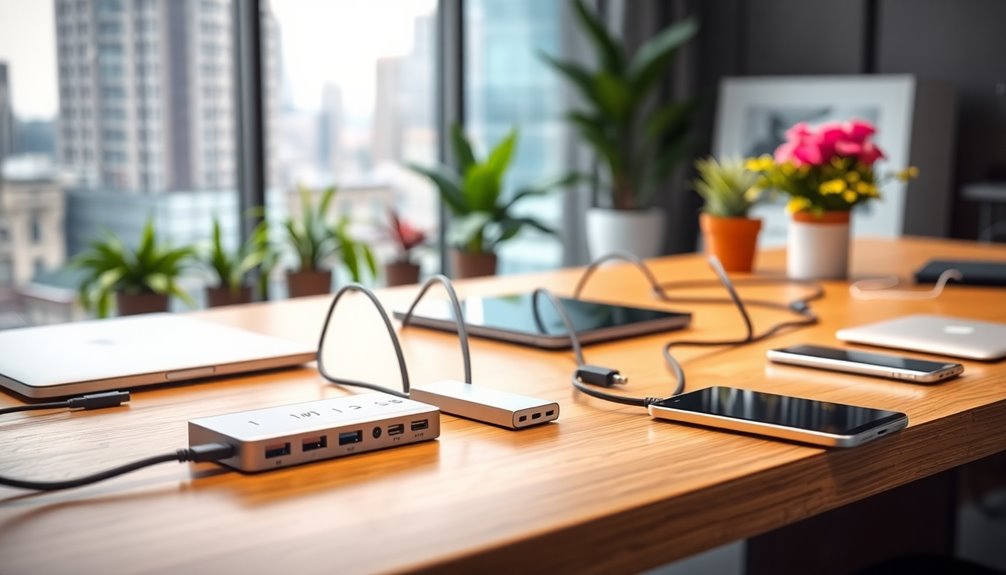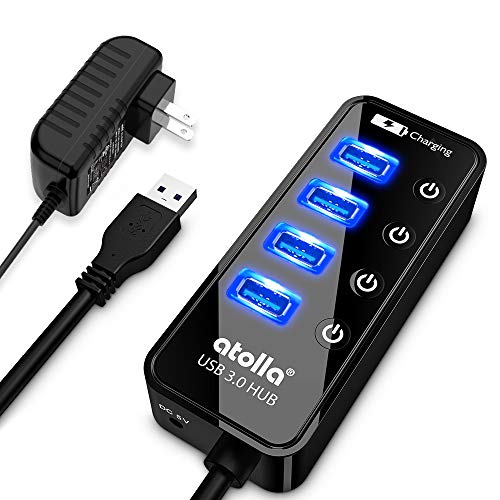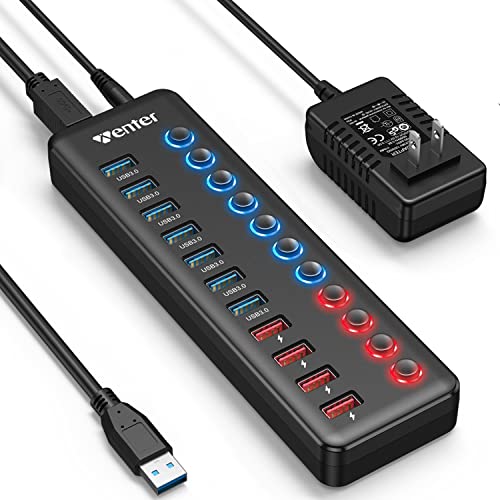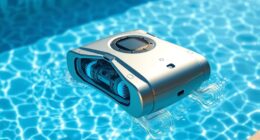I’m excited to share my picks for the 15 best USB hubs of 2025, which enhance your connectivity like never before. These hubs, ranging from the Anker 7-Port USB 3. 0 Hub to the ultra-slim BYEASY model, cater to diverse needs and setups. Each offers impressive data transfer speeds and a mix of ports, including PowerIQ charging capabilities. They’re portable and designed for easy use, giving you that seamless experience with your devices. If you stick around, I’ll break down the features that make each hub a must-have for your tech arsenal. Additionally, many of these hubs are perfect companions for the best external hard drives of 2025, ensuring you can transfer large files quickly and efficiently. With their robust construction and stylish designs, they not only enhance functionality but also complement your workspace aesthetic. Stay tuned as I explore the standout features of each USB hub and help you find the ideal one for your specific needs.
Key Takeaways
- USB hubs enhance connectivity by allowing multiple devices to connect through a single USB port, ideal for users with limited ports.
- Look for hubs with USB 3.0 support for faster data transfer speeds up to 5Gbps, essential for large file transfers.
- Consider models with individual power switches for better control and energy efficiency of connected devices.
- Port counts vary from 4 to over 11, so choose a hub that meets your specific connectivity needs.
- Ensure compatibility with multiple operating systems like Windows, macOS, and Linux for versatile use across different devices.
Acer USB Hub 4 Ports with USB 3.0 and Power Port
If you're someone who frequently needs to connect multiple devices to your laptop or desktop, the Acer USB Hub with 4 USB 3.0 ports is a game changer. It offers four ports that support lightning-fast data transfer speeds of up to 5Gbps, making it perfect for transferring large files like movies and photos. The slim design and 2ft cable enhance its portability, allowing me to easily toss it in my bag. I love the plug-and-play functionality, which means I don't need to deal with messy drivers. Plus, it works seamlessly with various systems like macOS and Windows. The built-in LED indicator is a handy touch, letting me know when everything's operational. It's a reliable companion for anyone needing extra USB connectivity.
Best For: Those who need to connect multiple USB devices to their laptop or desktop efficiently and without hassle.
Pros:
- High-speed data transfer of up to 5Gbps, ideal for large files.
- Compact and portable design with a 2ft cable for easy transportation.
- Plug-and-play functionality eliminates the need for drivers, ensuring quick setup.
Cons:
- Power port limited to powering the hub only, not for charging other devices.
- Short cable may limit placement flexibility in certain setups.
- Compatibility issues reported with some external drives.
Anker 7-Port USB 3.0 Data Hub with Power Adapter
The Anker 7-Port USB 3.0 Data Hub with Power Adapter is perfect for anyone juggling multiple devices, especially media professionals and gamers who need reliable connections. With its seven USB 3.0 SuperSpeed ports, you can enjoy data transfer rates up to 5Gbps, making it a breeze to connect external hard drives and peripherals. The hub also features a BC 1.2 charging port that supports charging speeds up to 2.1A, while the other ports provide sufficient power for your devices. I love the compact design and the numbered port display with blue LEDs that show active connections. Though the AC adapter can be bulky, the overall performance and plug-and-play functionality make this hub a fantastic choice for anyone needing extra USB ports.
Best For: Media professionals and gamers who require reliable connections and multiple USB ports for their devices.
Pros:
- Plug-and-play functionality makes it easy to set up without the need for additional drivers.
- High data transfer rates of up to 5Gbps support fast data handling for external devices.
- BC 1.2 charging port allows for quick charging of devices while still providing power to other connected peripherals.
Cons:
- Bulky AC adapter may block adjacent outlets, limiting space on power strips.
- Some users report occasional disconnections, necessitating power cycling to restore connections.
- Lack of individual port power control could be a drawback for those wanting better management of their devices.
Anker 4-Port USB 3.0 Hub
Looking for a reliable and efficient way to expand your USB capabilities? The Anker 4-Port USB 3.0 Hub is a fantastic choice. With a sleek, ultra-slim design, it fits seamlessly into any setup. The hub supports SuperSpeed data transfer at up to 5Gbps, so you can transfer an HD movie in seconds. Plus, the plug-and-play functionality means you won't have to fuss with drivers. I love the flexibility of the 2 ft cable, which allows me to position it just right. While it doesn't charge high-power devices, it handles multiple peripherals like webcams and keyboards without lag. It's lightweight, portable, and durable, making it a great addition to my tech arsenal. Plus, the 4.7-star rating speaks volumes!
Best For: Users looking for a compact and efficient USB hub to connect multiple peripherals without sacrificing speed or space.
Pros:
- Ultra-slim, lightweight, and portable design.
- Fast USB 3.0 speeds with data transfer up to 5Gbps.
- Flexible 2 ft cable for convenient positioning.
Cons:
- Does not support charging for high-power devices.
- Cable length may be insufficient for some setups.
- Initial unit inconsistency reported by a few users.
VIENON 4-Port USB Hub
For anyone juggling multiple devices, the VIENON 4-Port USB Hub stands out as a practical solution. It effortlessly expands one USB port into four, allowing me to connect everything from flash drives to keyboards without hassle. I love its plug-and-play functionality; there's no need for drivers, and the high-speed USB 3.0 guarantees fast data transfers up to 5 Gbps. Its ultra-slim design fits neatly on my desk, accommodating most devices without crowding. Plus, the blue LED indicator keeps me informed about its status. While some users mentioned concerns about the USB cord length, I've found it reliable for my gaming and work-from-home setup. Overall, it's a fantastic addition for anyone needing multiple connections.
Best For: The VIENON 4-Port USB Hub is best for users who need to connect multiple devices simultaneously, such as gamers and remote workers.
Pros:
- High-speed data transfer rates of up to 5 Gbps with USB 3.0 compatibility.
- Plug-and-play functionality makes setup quick and easy, with no drivers required.
- Compact and ultra-slim design allows for efficient use of desk space while accommodating most devices.
Cons:
- Some users reported issues with the length of the USB cord, limiting placement options.
- A few customers experienced malfunctioning units, indicating potential quality control concerns.
- Limited charging capabilities, as the hub does not support charging devices.
Anker 332 USB-C Hub (5-in-1) with 4K HDMI Display
Designed with professionals in mind, the Anker 332 USB-C Hub (5-in-1) seamlessly connects multiple devices while ensuring portability. With its 4K HDMI port, I can enjoy stunning visuals on my external monitor, while the two USB-A ports and a USB-C data port allow for quick file transfers at 5 Gbps. Weighing just 1.4 ounces and measuring 4.78 x 1.59 x 0.45 inches, it easily fits in my laptop bag.
The hub also supports pass-through charging up to 85W, keeping my laptop powered during use. While most users rave about its reliability, I've heard some mention HDMI compatibility issues. Overall, I find it a valuable tool for enhancing my laptop's capabilities without sacrificing space.
Best For: Professionals and students seeking a compact, versatile hub to connect multiple devices and enhance their laptop's functionality.
Pros:
- Compact and portable design, easily fits in a laptop bag for on-the-go use.
- High-speed data transfer at 5 Gbps ensures quick file sharing and device connectivity.
- Pass-through charging capability allows for simultaneous use and charging of laptops.
Cons:
- Some users have reported HDMI compatibility issues with specific monitors.
- Lack of a user manual noted, although customer service is responsive for assistance.
- Limited support for higher refresh rates at 4K resolution (30Hz only).
Atolla 7-Port USB Hub 3.0 with Smart Charging Port
The Atolla 7-Port USB Hub 3.0 with Smart Charging Port is perfect for tech enthusiasts who juggle multiple devices daily. With seven USB 3.0 ports and one dedicated smart charging port, it easily expands your connectivity options. I love the data transfer speed of up to 5Gbps, which keeps everything running smoothly. Each port comes with an individual on/off switch, giving me complete control over power management. Plus, the powered hub guarantees reliable performance, even when I've got several devices connected. While some users have reported issues with power supply over time, my experience has been positive. Overall, this hub is a fantastic solution for anyone needing extra USB ports without sacrificing performance.
Best For: Tech enthusiasts and professionals who need to connect multiple devices simultaneously for efficient data transfer and charging.
Pros:
- Individual on/off switches for each USB port allow for easy power management.
- Fast data transfer speed of up to 5Gbps ensures smooth operation for connected devices.
- Powered design offers reliable performance even with multiple devices connected.
Cons:
- Some users have reported power supply failures after extended use.
- Limited number of charging ports may not meet all users' needs.
- Instances of USB 3.0 functionality issues, especially with high-capacity drives, have been reported.
SABRENT 10-Port USB 3.0 Hub with Power Switches and Adapter
With its 10 USB 3.0 ports and individual power switches, the SABRENT 10-Port USB Hub is perfect for anyone juggling multiple devices. I love how each port has its own switch, making it super easy to manage my peripherals without hassle. The hub boasts data transfer speeds of up to 5Gbps, which is impressive for my needs. Plus, the included 60W power adapter guarantees I can charge devices quickly and reliably. I appreciate the compact design and blue LED indicators, which add a touch of style to my workspace. While some larger flash drives might not fit perfectly, overall, this hub has proven durable and efficient, easily earning its 4.5-star rating from users.
Best For: Users who need to connect multiple USB devices simultaneously and manage them easily with individual power switches.
Pros:
- Each port features an on/off switch for convenient management of connected devices.
- High data transfer speeds of up to 5Gbps for efficient file transfers.
- Compact design with blue LED indicators enhances workspace aesthetics.
Cons:
- Some larger flash drives may not fit well into the hub.
- Charging ports do not support data transfer, which may disappoint some users.
- Suggestions for better illumination of switches and longer USB cables have been noted by some users.
Anker 10 Port 60W Data Hub with USB 3.0 and PowerIQ Charging Ports
If you're someone who juggles multiple devices and needs a reliable solution for both data transfer and charging, the Anker 10 Port 60W Data Hub is a standout choice. With seven USB 3.0 ports, you can connect external drives, keyboards, and webcams, all while enjoying data transfer speeds of up to 5Gbps. Plus, the three PowerIQ charging ports guarantee your devices get a quick boost, delivering up to 2.1 amps each. Weighing just 3.7 ounces and measuring roughly the size of a pen case, it's compact and easy to use. Users rave about its performance and durability, often using it for years without issues. Trust me, this hub is a game-changer for anyone needing efficient connectivity.
Best For: Those who frequently connect multiple devices and require fast data transfer and charging capabilities in a compact design.
Pros:
- Multiple Ports: Offers 7 USB 3.0 ports and 3 PowerIQ charging ports for versatile connectivity.
- High Performance: Achieves data transfer speeds up to 5Gbps and charging speeds up to 2.1 amps.
- Durable Design: Users report reliability and long-term use, with many experiencing no issues after years of usage.
Cons:
- Latency with Wireless Devices: Wireless peripherals may encounter latency when connected to USB 3.0 ports.
- Requires External Power: High-speed performance necessitates the use of an external power adapter.
- Limited Charging for Some Devices: Charging performance may vary based on the device connected, with some devices drawing less power.
Wenter 11-Port Powered USB Hub
Looking for a reliable USB hub that can accommodate all your devices? The Wenter 11-Port Powered USB Hub is a fantastic choice. With ten USB 3.0 data ports and one smart charging port, I can easily connect everything from keyboards to hard drives. It offers impressive transfer speeds of up to 5Gbps, ensuring my data moves quickly without lag. I love the individual on/off switches for each port, letting me control power use efficiently. Plus, with a solid build and a 24-month warranty, I feel confident in its durability. Although some users note slower charging for certain devices, its overall performance and reliability make it a top contender for anyone needing extra connectivity.
Best For: Users who need to connect multiple devices and require efficient data transfer and charging capabilities.
Pros:
- Multiple Ports: Offers 10 USB 3.0 data ports and 1 smart charging port for extensive connectivity.
- Fast Data Transfer: Achieves transfer speeds up to 5Gbps, ensuring quick and smooth data transfers.
- Individual Control: Each port features an on/off switch and LED indicator, providing efficient power management.
Cons:
- Size: Some users find the hub to be larger than expected, which might not fit all desk spaces.
- Short USB Cable: The included USB cable may be too short for certain setups, limiting placement options.
- Variable Charging Speed: Some devices experience slower charging speeds, which can be a drawback for certain users.
Atolla 4-Port USB 3.0 Hub
The Atolla 4-Port USB 3.0 Hub stands out as an excellent choice for anyone juggling multiple USB devices, thanks to its ability to expand a single USB port into four data ports and one smart charging port. With data syncing speeds up to 5Gbps, it handles demands from hard drives and peripherals effortlessly. I love the individual illuminated switches for each port, making it easy to manage connections without fumbling with plugs. Weighing just 6.8 ounces and featuring a compact design, it fits perfectly on my desk. Plus, the 18-month warranty provides peace of mind. While some users reported minor stability issues, the overall performance and reliability make it a strong contender for anyone needing extra USB connectivity.
Best For: The Atolla 4-Port USB 3.0 Hub is best for users who need to connect multiple USB devices efficiently, especially in data-heavy tasks like video and photo editing.
Pros:
- High-Speed Data Transfer: Offers data syncing speeds up to 5Gbps, making it ideal for demanding devices.
- Individual Port Control: Features illuminated on/off switches for each port, allowing easy management of connected devices.
- Compact and Portable: Lightweight design and compact size make it easy to fit on any desk without clutter.
Cons:
- Stability Issues: Some users have reported minor stability concerns, requiring occasional restarts to reconnect devices.
- Durability Concerns: A few users noted that the hub feels lightweight, raising questions about long-term durability.
- Tight Ports: Certain ports can be tight, making it difficult to connect and disconnect devices smoothly.
Wenter 11-Port USB 3.0 Hub Splitter
For anyone juggling multiple devices, the Wenter 11-Port Powered USB 3.0 Hub is a game changer. It expands just one USB port into seven data ports and adds four smart charging ports, delivering up to 2.4 amps each for quick charging. With a data transfer speed of up to 5Gbps, I've noticed a significant boost in my workflow. The individual on/off switches and LED indicators are thoughtful features that enhance usability. While it's a bit bulky for travel, its solid build quality and plug-and-play setup make it perfect for stationary use at home. Plus, its compatibility with various operating systems means I can connect a wide range of devices without hassle. This hub's definitely a worthy investment!
Best For: Heavy users needing multiple USB ports and fast charging capabilities for various devices.
Pros:
- Expands a single USB port into seven data ports and four smart charging ports for enhanced connectivity.
- Fast data transfer speeds of up to 5Gbps improve workflow efficiency.
- User-friendly with individual on/off switches and LED indicators for each port.
Cons:
- Bulky design makes it less suitable for travel compared to smaller hubs.
- Slight high-pitched noise from the AC transformer may be distracting in quiet environments.
- Charging ports are not suitable for peripherals, which can lead to potential damage if misused.
VIENON Aluminum 7 in 1 USB C Hub
Designed with versatility in mind, the VIENON Aluminum 7 in 1 USB C Hub is an excellent choice for anyone needing to connect multiple devices simultaneously. With one USB 3.0 port and four USB 2.0 ports, it supports transfer speeds up to 5Gb/s. I found it compatible with a variety of devices, including my MacBook Pro and gaming consoles. However, the compact design has its drawbacks; the small USB slots can make cable insertion tricky. I've also read mixed reviews regarding power allocation issues, which caused some users' devices to short out. While some appreciate its seamless connectivity, others warn of reliability concerns and overheating. If you're considering this hub, weigh the pros and cons carefully.
Best For: Users who need a compact and versatile hub to connect multiple USB devices simultaneously, such as laptops, gaming consoles, and peripherals.
Pros:
- Supports high-speed data transfer with USB 3.0 offering up to 5Gb/s.
- Broad compatibility with various devices and operating systems, including Mac and Windows.
- Compact design enhances portability for on-the-go use.
Cons:
- Small USB slots can make cable insertion difficult for some users.
- Reported reliability issues, including overheating and power allocation problems.
- Inconsistent performance with certain devices, leading to connectivity failures.
USB 3.0 Hub, 4 Port USB Hub Splitter
Looking to expand your USB connectivity without clutter? The USB 3.0 Hub, 4 Port USB Hub Splitter from ANYPLUS is a fantastic solution. With its compact size of just 1.46 x 0.43 x 3.62 inches and a lightweight design at 1.41 ounces, it easily fits into any setup. This hub expands one USB port into four, allowing you to connect multiple devices simultaneously without overheating. It supports impressive transfer speeds of up to 5Gbps, making data transfers a breeze. Compatible with various operating systems and devices, it's perfect for laptops, PCs, and even gaming consoles like Xbox and PS4. Plus, with a solid rating of 4.6 stars, users rave about its functionality and ease of use.
Best For: Users seeking to expand their USB connectivity with a compact and efficient hub for multiple devices.
Pros:
- Fast Transfer Speeds: Supports data transfer speeds of up to 5Gbps with USB 3.0.
- Compact Design: Lightweight and portable, making it easy to carry and fit into any setup.
- Wide Compatibility: Works with various operating systems and devices including laptops, PCs, and gaming consoles.
Cons:
- Power Limitation: Maximum output current is 900mA, which may not support devices requiring more power.
- Compatibility Issues: Some devices, like the Sony A7RV camera, may have compatibility problems.
- Not for Charging: The hub is not suitable for charging devices, limiting its utility for power-hungry gadgets.
BYEASY USB 3.0 Hub, 4 Port Ultra Slim Portable Data Hub
The BYEASY USB 3.0 Hub stands out as the perfect solution for on-the-go professionals who need a compact, high-speed way to connect multiple devices. This ultra-slim hub offers four USB 3.0 ports, supporting impressive transfer speeds up to 5Gbps. I appreciate how it instantly recognizes my devices without any setup hassle, thanks to its plug-and-play functionality. Plus, it stays cool during long sessions, making it ideal for transferring large files like HD videos or photo collections. While it's compatible with various devices and operating systems, remember that it's not designed to charge high-power devices. Overall, this hub is a reliable companion for anyone needing extra USB ports in a portable form factor.
Best For: On-the-go professionals and users needing extra USB ports for connecting multiple devices quickly and efficiently.
Pros:
- Plug and play functionality allows for instant recognition of devices without setup hassles.
- Ultra-slim and portable design makes it easy to carry and use in various environments.
- Supports high transfer speeds up to 5Gbps, ideal for transferring large files quickly.
Cons:
- Not designed for charging high-power devices, limiting functionality for some users.
- Maximum output current of 900mA may require an external power adapter for certain hard drives.
- Limited to USB 3.0 speeds, which may not benefit users with older USB 1.1 or 2.0 devices.
TP-Link Powered USB Hub 3.0 with 7 Data Ports and 2 Smart Charging Ports
For anyone juggling multiple devices, the TP-Link Powered USB Hub 3.0 with 7 data ports and 2 smart charging ports stands out as an ideal solution. It boasts transfer speeds up to 5Gbps—ten times faster than USB 2.0—making data transfer a breeze. The two smart charging ports deliver ultra-fast charging, ensuring my smartphones and tablets are powered up quickly. Plus, its compatibility with Windows, Mac, Chrome, and Linux means it seamlessly fits into any setup. I appreciate the safety features, including protections against overheating and short circuits, which give me peace of mind. With its durable design and excellent performance, I can't recommend this hub enough for both home and office use.
Best For: Those in need of a reliable and high-speed USB hub for multiple devices, especially in home or office environments.
Pros:
- Fast data transfer speeds of up to 5Gbps, making it efficient for large file transfers.
- Two smart charging ports for ultra-fast charging of smartphones and tablets.
- Safety features including protections against overheating, overload, and short circuits, ensuring device safety.
Cons:
- Requires external power adapter, which may be less convenient for portable use.
- Limited to USB 3.0 speeds; older devices will not benefit from the increased speed.
- Some users may find the size bulky, making it less ideal for travel.
Factors to Consider When Choosing USB Hubs
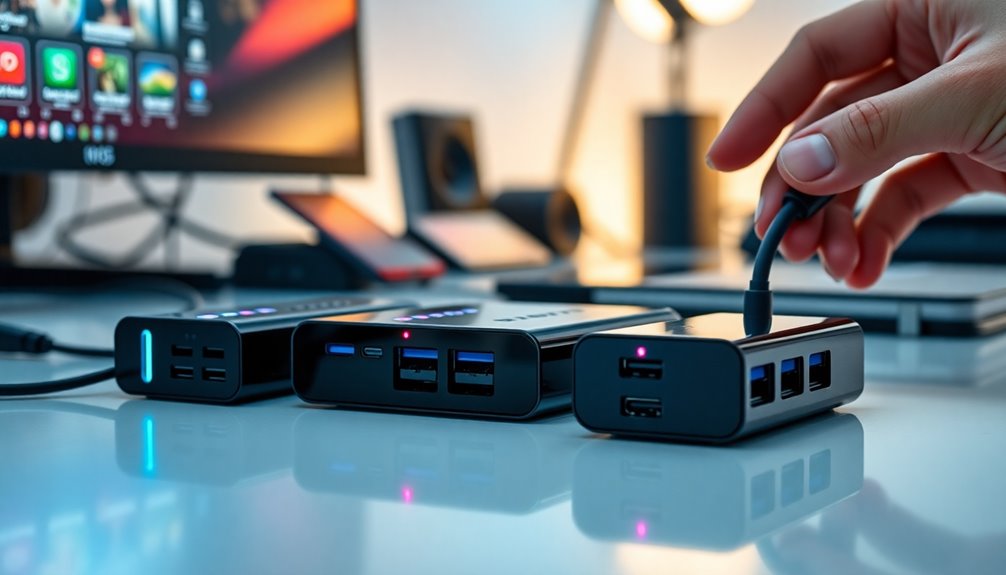
When I'm choosing a USB hub, I always think about the number and types of ports I need. It's also essential to take into account data transfer speeds and power supply options to guarantee compatibility with my devices. Finally, I like to look at the design and portability, especially if I'm on the go.
Port Count and Types
Choosing the right USB hub can greatly enhance your device connectivity experience, especially with options ranging from 4 to over 11 ports. When I'm picking a hub, I always consider how many devices I need to connect. A 4-port hub might suffice for simple setups, but if I'm using multiple peripherals, I lean towards those with 11 or more ports.
It's vital to look at the types of ports available too. I prefer USB 3.0 ports for their high-speed data transfer capabilities, but I also value USB-C ports for modern devices. They guarantee I can connect everything seamlessly.
Another feature I find handy is dedicated charging ports. These can deliver up to 2.4A, which means my devices charge faster while I'm working. I also appreciate hubs with individual on/off switches for each port, giving me better control over power management.
Lastly, compatibility with operating systems is essential. I want to verify my hub works flawlessly with Windows, macOS, or Linux, so all my devices function properly across different platforms. Prioritizing these factors will help you find the perfect USB hub for your needs.
Data Transfer Speeds
While selecting a USB hub, the significance of data transfer speeds can't be overstated. USB 3.0 technology typically supports speeds up to 5Gbps, which is a massive leap from the 480Mbps offered by USB 2.0. When I connect multiple devices, I've noticed that the actual data transfer speed often varies. Factors like the number of connected devices, the quality of the cables, and the specifications of the host device can all impact performance.
For the best results, I always connect high-capacity external drives to USB 3.0 ports. They handle larger files and faster speeds far better than their USB 2.0 counterparts. It's also worth noting that many USB hubs come with backward compatibility, meaning they'll work with older devices. However, keep in mind that the transfer speed will revert to the highest speed supported by those older devices.
Lastly, I've learned that considering the maximum output current available per port is vital. Devices needing more power may not hit peak data transfer rates without sufficient power. So, when choosing a hub, think about these aspects to guarantee you get the performance you need.
Power Supply Options
After considering data transfer speeds, the power supply options of a USB hub play a significant role in overall performance. When I choose a USB hub, I often look for powered options that use an external power adapter. These hubs can reliably support multiple devices and high-capacity peripherals, which is a must for my tech setup.
I also appreciate hubs with smart charging ports, as they deliver higher current outputs—up to 2.4A—allowing me to charge devices like smartphones and tablets quickly. Standard data ports only provide around 500mA, so having those smart ports makes a noticeable difference.
Another feature that catches my eye is individual power switches for each port. This allows me to manage power to my devices independently, enhancing energy efficiency and safety. Plus, I keep an eye on the total wattage supplied; a hub with a 12V/5A power adapter can deliver up to 60W, supporting several devices without risk of overload.
Compatibility With Devices
When selecting a USB hub, it's important to guarantee compatibility with your devices and operating systems. I always check if the hub supports my OS, whether it's Windows, macOS, Chrome OS, or Linux. This assures smooth functionality.
Next, I look at the USB standard the hub supports. USB 3.0 is a must for me since it offers data transfer speeds up to 5Gbps, while USB 2.0 only reaches 480Mbps. Speed matters, especially if I'm transferring large files.
The number and type of ports are also significant. I prefer hubs with a mix of USB-A, USB-C, and charging ports for versatility. It's crucial to confirm that the hub can handle the power requirements of my devices, as some are designed solely for data transfer and may not charge high-power devices effectively.
Lastly, I check for backward compatibility with older USB versions like USB 2.0/1.1. This way, I guarantee my hub works with a broader range of devices. By considering these factors, I can confidently choose a USB hub that meets all my connectivity needs.
Design and Portability
Choosing a USB hub isn't just about functionality; the design and portability also play an essential role in my decision-making process. When I look for a hub, I prioritize size and weight, as ultra-slim and lightweight models are so much easier to transport. If I'm frequently on the go, I want something that won't weigh me down.
The length of the integrated cable is another aspect I consider. A longer cable gives me the flexibility to set up my devices without being constrained by distance from my computer. Compact designs are a must, too; I prefer hubs that fit easily into my bag or briefcase, making them convenient for travel.
Aesthetics matter to me as well. The material quality and finish can enhance my workspace's overall look while contributing to durability. Finally, I pay attention to the arrangement of ports. A well-designed hub has enough space between ports to avoid blocking adjacent connectors, which is essential when I'm using larger USB devices. By focusing on these design and portability factors, I guarantee my USB hub meets both my functional and lifestyle needs.
Frequently Asked Questions
Can USB Hubs Damage My Devices or Data?
I've wondered if USB hubs can damage my devices or data too. Generally, if you use a well-made hub from a reputable brand, you shouldn't run into issues. However, cheap or poorly designed hubs can cause power surges or data corruption. I've always made sure to check reviews and specifications before purchasing one. Just be cautious, and you should be fine—it's all about choosing quality over price when it comes to your tech.
How Do I Know if a USB Hub Is Compatible With My Device?
To know if a USB hub's compatible with your device, I usually check the specifications of both the hub and my device. I look for the USB type—like USB-A or USB-C—and guarantee they match. I also check the power requirements; some hubs need external power for high-demand devices. If I'm unsure, I read reviews or ask the manufacturer directly. It's always better to verify compatibility before purchasing.
What Is the Difference Between Powered and Unpowered USB Hubs?
When I look at USB hubs, I notice there's a big difference between powered and unpowered ones. Powered hubs connect to an external power source, giving me extra power to run multiple devices like hard drives or printers. Unpowered hubs rely on my computer's USB port for power, which can limit how many devices I can use simultaneously. So, if I need to connect several high-draw devices, I'd definitely choose a powered hub.
Can I Connect Multiple USB Hubs Together for More Ports?
Did you know that around 70% of people use multiple devices simultaneously? I've found that connecting multiple USB hubs together is definitely possible, and it can give you more ports. Just make sure the hubs are compatible with each other and your devices. However, keep in mind that the total power available might be limited, especially if you're using unpowered hubs. I recommend using powered hubs for peak performance.
How Do I Troubleshoot a Malfunctioning USB Hub?
When my USB hub malfunctions, I first check the power source. I unplug it and reconnect it to guarantee it's powered properly. Next, I test it on another device to rule out compatibility issues. If it's still acting up, I examine the cables for damage. Sometimes, a simple restart of my computer helps, too. If nothing works, I consider updating the drivers or replacing the hub altogether.
Conclusion
In my quest for the best USB hubs, I found that the right choice can really transform your connectivity experience. It's surprising how a simple hub can streamline my desk setup and boost productivity. Whether you're a casual user or a tech enthusiast, there's a perfect hub out there for you. So, as you explore this guide, remember: the right USB hub might just be the unsung hero of your tech arsenal! Happy connecting!
